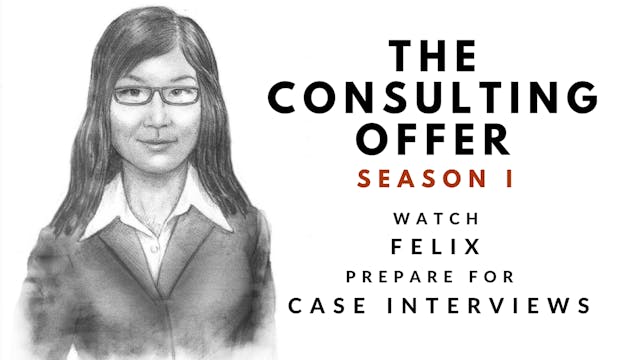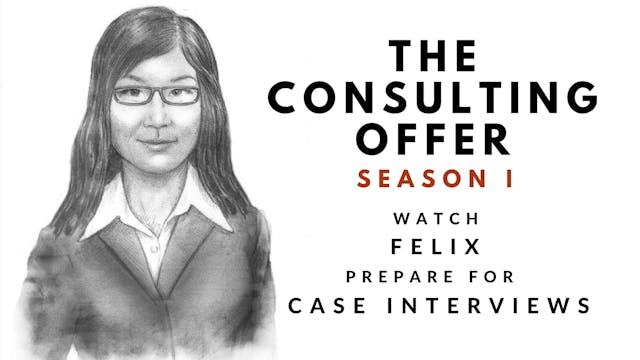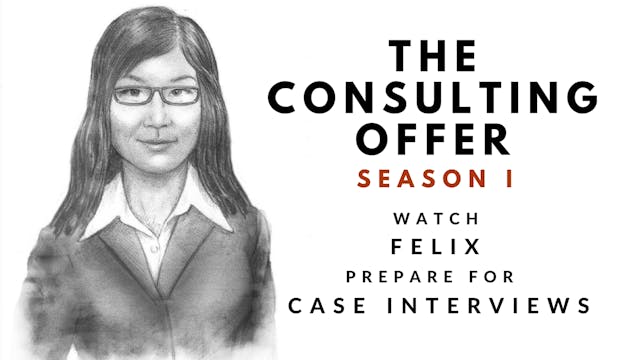Case Coaching Video, Felix Session 14, McKinsey Competition Cases
The Consulting Offer 1: Felix's Case Interview Coaching Videos
•
1h 38m
Session 14: Competition Strategy Cases & Content Traps
Congratulations to the final 2 candidates who make it past session 13.
Special congratulations to the candidate who now will be coached by Michael Boricki, ex-big 3 strategy principal, and mentored by the former-McKinsey director and worldwide strategy practice leader. This will give the candidate a serious advantage against other applicants.
Competition cases are a misnomer and misleading. If all cases should examine competitors and the competitive dynamic of an industry, how can there be isolated competition cases?
We, therefore, teach the competition strategy case technique not because we expect a candidate to receive cases using just this isolated competition logic, but rather to present a way to analyse competition issues within any case.
That an entire session is dedicated to competition analysis should indicate just how important this technique is. Too many candidates apply the Porter’s Five Forces, thinking it is enough to analyse competitors. There are too many problems using the Porter approach. Primarily, we have yet to see a candidate apply this technique correctly, because the majority of candidates have a very superficial understanding of the theory and techniques behind this framework.
Candidates can use any technique here such as comparing external and internal issues, provided they can logically explain their process. That is the most important step.
At this point, we slightly remove the training wheels by removing prompts. Rather than explicitly asking candidates to “brainstorm” or “estimate” a number, we use different, vaguer terms and expect them to naturally use these skills. It is an important stage in a candidate’s maturity.
Around this time, we are also wary of candidates falling into the content trap. The content trap is the belief of many candidates, that if they just do enough cases they will have seen every type of case, and this will help them obtain an offer. The content trap is dangerous for two major reasons. First, you can never ever do every type of case. There are just too many. If you go down the content path, you will always come up against a case you never had seen before and fail. Second, most important, is that cases are like math questions.
You do not get better at cases by doing many of them – in fact, if you do many cases using the wrong technique you simply enforce bad behaviour and become worse. You can only get better by understanding the underlying principles of a case, and applying the right techniques to solve them. Therefore, it is more important to understand the underlying principles and quickly learn how to apply them. In other words, do fewer cases, but understand them well. We test for this by slightly varying the cases we give, to ensure they are slightly different from our case videos.
We also like to simply throw out cases at random to see how the candidate responds. We call them the case drills, which is basically 5 random cases in about 15 minutes to see the thinking and structuring.
As we are quite far into teaching candidates how to do cases, they need to now begin practising with peers. One can only practice after one has learned how to do cases – hence the order of teaching followed by practising. Candidates are always cautioned to be wary of practice using unusual techniques, which are new to them, and to be careful remembering what must be learned from these practising sessions, and what must be discarded. Just because a practice partner does something and says he read it in y or saw it in x does not make it right. Question everything.
Technique and understanding is more important, and candidates should always be focusing on the fundamentals.
Candidates, who do not take extra care, can end up learning poor techniques and derailing their training. It is a good idea to go through case books, but focus more on the structure than trying to solve the case. In a manner of speaking, these are drills. When candidates practice, we strongly advise them to record the session, audio or video, and load it to their files for us to review. This helps us track progress and identify areas for improvement. We can also guide the practice sessions in real-time to ensure bad-behaviour is not being learned.
In the session descriptions which follow, we are using one description for 4 different candidates. Yet candidates do not perform the same, and while the descriptions are mostly accurate, there will be some differences as a few cases are brought forward, others moved back or candidates fail to prepare adequately. While these differences are minor, they sometimes occur.
Cases questions taught in the session:
Felix’s cases recorded in the session; Television trend hypotheses development, Brainstorm why reality TV has increased, Healthcare article discussion, Al Jazeera wants to enter the US cable market, BCG Media sector data interpretation.
Sanjeev’s cases recorded in the session; Estimate the dollar value of food thrown from a store kitchen in a day at Costco, Brainstorm how Louis Vuitton should choose its next location in the US, Louis Vuitton is entering the Mongolian market and Burberry wants to know what to do & BCG Luxury sector data interpretation.
Up Next in The Consulting Offer 1: Felix's Case Interview Coaching Videos
-
Case Coaching Video, Felix Session 15...
Session 15: Pricing Cases
There is no framework for pricing, but there is a simple way to approach pricing problems.
Candidates are too often, incorrectly, taught that there are just 4 pricing strategies: product-based, cost-based, market-based or competition-based. In reality, there are a ...
-
Case Coaching Video, Felix Session 16...
Session 16: Pricing Cases
There is no framework for pricing, but there is a simple way to approach pricing problems.
Candidates are too often, incorrectly, taught that there are just 4 pricing strategies: product-based, cost-based, market-based or competition-based. In reality, there are a ...
-
Case Coaching Video, Felix Session 17...
Session 17: Deregulation Cases
If consulting cases would be grouped into seasons, deregulation cases would be Halloween – they scare everyone!
We use deregulation cases to show candidates that just because something appears intimidating, it does not mean it should always have fancy structur...


